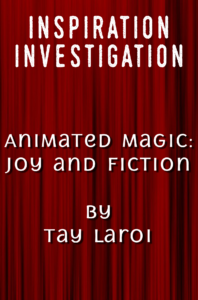 I lived off a steady diet of cartoons growing up. Disney, Cartoon Network, Nickelodeon, Dream Works, Don Bluth, Studio Ghibli, and probably more I don’t remember. If it was animated, odds are I watched it or at least knew about it. I liked plenty of live-action stuff too—I watched Jumanji a million times, despite the nightmares, and Disney Channel Original Movies were my jam—but animation has always had a huge pull on me. Even as an adult, I’m willing to give a well-done animated movie a viewing, which is exactly how I stumbled upon the work of Mamoru Hosoda.
I lived off a steady diet of cartoons growing up. Disney, Cartoon Network, Nickelodeon, Dream Works, Don Bluth, Studio Ghibli, and probably more I don’t remember. If it was animated, odds are I watched it or at least knew about it. I liked plenty of live-action stuff too—I watched Jumanji a million times, despite the nightmares, and Disney Channel Original Movies were my jam—but animation has always had a huge pull on me. Even as an adult, I’m willing to give a well-done animated movie a viewing, which is exactly how I stumbled upon the work of Mamoru Hosoda.
Despite having 21 awards and 7 nominations under his belt for his work, his name has only recently begun to circulate among Western audiences. While his debut film The Girl Who Leapt through Time was praised by critics, his second film, Summer Wars, was what really made people sit up and take note. His next film, Wolf Children, was a quieter piece, so it didn’t draw quite as much attention, and I haven’t seen his most recent film, The Boy and the Beast, so I’m not sure how much buzz is circulating about it, but I’m sure it’s awesome.
I would have trouble finding things I don’t like about Hosoda’s work. A few scenes are awkward and the English dubbing of the dialogue can be cheesy, but that just comes with the medium. He takes full advantage of animation and everything it’s capable of, capturing the most spellbinding imagery as well as the most tranquil heartfelt scenes. His characters are fun and enjoyable and his stories bring new twists on simple familiar ideas. For example, the dangers and risks of cyberspace have been sufficiently explored, but how often does it take three generations of a family to defeat them, like in Summer Wars? The idea of werewolves walking among us is nothing new, but Wolf Children is the first film I’ve seen where the focus is not on wolves, but on a single mother raising them.
By far the strongest element of Hosoda’s work and the one that most strongly influences my work is the way he weaves the human experience into the fantastic. No matter how outlandish things get (and they get pretty outlandish) you never forget that these stories are first and foremost about humanity. The Girl Who Leapt through Time is about a teenaged girl who can time travel, but it’s also about the universal human uneasiness with change and the desire for things to stay the same and feel in control. Like I mentioned before, Wolf Children is more so about the struggles of single motherhood than the existence of werewolves. In Summer Wars, an out of control A.I. threatens to bring society to its knees and it’s up to an enormous family to pull together in a time of grief to save everything they hold dear.
Most of that humanity comes out in the balance between struggle, hope, and joy, which I would love to be able to capture. The characters in all Hosoda’s films go through very real trials throughout their films, all of which are incredibly heart-wrenching. They have to say goodbye to life-long friends, loved ones pass away, they have to start over in new places and find where they belong in worlds that don’t seem to want them. The fantastic elements of his stories make the trials larger than life, which only serve to make their triumphs larger than life. The endings to all his films are perfect for their stories, even though they’re not ever completely happy. They’re mixed with joy at the fact that the protagonists are victorious, a bit of sadness at what was lost in the struggle, and hope that the future will continue to hold good things.
So far in my twenty-four years of life, a lot of experiences have turned out like that, minus the crazy A.I.s, time travel, and werewolves, and that’s what I hope to always portray in my books: the human in the fantastic. The stillness in knowing you’re not alone in your experiences within the storm of whatever life may throw at you.
As a medium, I think writers could learn a lot about pacing from film. With movies, you’re usually limited to two hours, two and a half, tops, before you start losing your audience, so it’s important to share with your audience the information they need to know at the right time and in an efficient matter. While writers do get more wiggle room with the length of their work, I still think it’s important to use those allotted pages wisely.
Fantasy writers are particularly bad about this, I think. While world-building and backstories are important, I think the current action and what characters are doing in the moment tends to be more important. Look at the original Star Wars trilogy, for example. They don’t spend a whole lot of time with exposition, only what we need to understand what’s going on in the moment and they build as the story moves along. I think a lot of creators could benefit from condensing their work and leaving more to the imagination.
I also think there are a lot more things writers could learn from film, but I’ll let my partners get to them in their articles. 🙂

